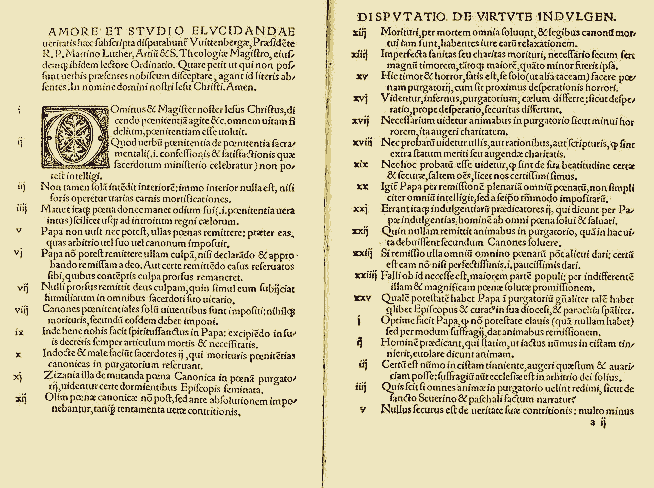Reformation Martin Luther

Part of a series on Reformation
The Reformation, specifically referred to as the Protestant Reformation, was a schism in Western Christianity initiated by Martin Luther and continued by John Calvin, Huldrych Zwingli, and other early Protestant Reformers in 16th-century Europe. It is usually considered to have started with the publication of the Ninety-five Theses by Martin Luther in 1517 and lasted until the end of the Thirty Years' War with the Peace of Westphalia in 1648.
Although there had been significant earlier attempts to reform the Catholic Church before Luther – such as those of Jan Hus, Peter Waldo, and John Wycliffe – Luther is widely acknowledged to have started the Reformation with the Ninety-five Theses. Luther began by criticising the sale of indulgences, insisting that the Pope had no authority over purgatory and that the Catholic doctrine of the merits of the saints had no foundation in the Bible. The Protestant Reformation, however, would come to incorporate doctrinal changes such as a complete reliance on Scripture as the only source of proper belief (sola scriptura) and the belief that faith in Jesus, and not good works, is the only way to obtain God's pardon for sin (sola fide). The core motivation behind these changes was theological, though many other factors played a part, including the rise of nationalism, the Western Schism that eroded loyalty to the Papacy, the perceived corruption of the Roman Curia, the impact of humanism, and the new learning of the Renaissance that questioned much traditional thought.
The initial movement within Germany diversified, and other reform impulses arose independently of Luther. The spread of Gutenberg's printing press provided the means for the rapid dissemination of religious materials in the vernacular. The largest groups were the Lutherans and Calvinists. Lutheran churches were founded mostly in Germany, the Baltics and Scandinavia, while the Reformed ones were founded in Switzerland, Hungary, France, the Netherlands and Scotland. The movement influenced the Church of England decisively after 1547 under Edward VI and Elizabeth I, although the Church of England had been made independent under Henry VIII in the early 1530s.
There were also reformation movements throughout continental Europe known as the Radical Reformation, which gave rise to the Anabaptist, Moravian and other Pietistic movements. Radical Reformers, besides forming communities outside state sanction, often employed more extreme doctrinal change, such as the rejection of the tenets of the late antique councils of Nicaea and Chalcedon.
The Catholic Church responded with a Counter-Reformation initiated by the Council of Trent. Much work in battling Protestantism was done by the well-organised new order of the Jesuits. In general, Northern Europe, with the exception of most of Ireland, Poland and Lithuania, came under the influence of Protestantism. Southern Europe remained Catholic, while Central Europe was a site of a fierce conflict, culminating in the Thirty Years' War, which left it devastated.













0 comments
Sign in or create a free account